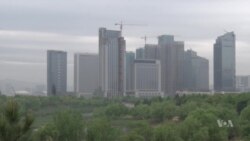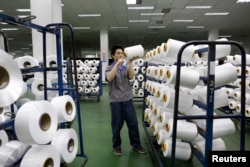As worries about the Chinese economy persist, economists are debating the possibility it could see a hard-landing or lengthy recession. For most though, debate or no debate, the slowdown has become a reality and the question that matters most is finding a way to keep business going.
In China’s mountainside commerce city of Yiwu, sellers are clearly feeling the pain, but also finding ways to weather the storm as well.
Henry Kou’s family has been in the porcelain business for decades. And business was good when China’s export driven economy was booming. But now, as the Chinese economy is growing at its slowest rate in more than a quarter of a century, peddling plates, porcelain tea kettles and ornately decorated containers is a fragile endeavor.
Much like the product he sells.
And it is not just the slowing economy at home, he adds. Wars overseas, currency fluctuations and a broader economic malaise are all adding to the challenges.
Cutting profits
Over the past two years, sales have dropped dramatically, he said, by about 20 percent. To keep afloat, he’s cutting production and packaging costs, even his own profits.
“Our customers are really hurting too, so we’ve tried to limit our profits in the hope that we can keep business going,” Kou said.
Kou has storefront in Yiwu’s massive wholesale market, a lengthy trade mall that stretches for several kilometers and houses more than 60,000 store fronts. Operators of the facility note that if you were to spend at least three minutes in each store, it would take at least 13 months to tour the entire facility.
Located in China’s southeastern province of Zhejiang, Yiwu is not far from the port cities of Shanghai and Ningbo.
But merchants consider Yiwu a good place to do business because of the support and freedom the local government gives sellers, from tax breaks to comparatively less interference in business.
And while its location lacks some of the advantages of China’s big coastal trading and manufacturing cities, the area has a long history of being a base for traders.
China’s Communist led government tried to stamp that out – albeit unsuccessfully – but later allowed trading to flourish when market reforms began in the 1980s.
Today, it is known as the small commodities wholesale capital of the world.
Almost everything and anything that is made in China can be found and purchased in the city. From there, goods are shipped across the globe to Africa, the Middle East, to Europe and America.
Niche markets
Some of Kou’s key customers are in the Middle East and Europe. He says that while sellers like himself can do little to change the overall environment they are facing, he’s finding ways to shield his business, including focusing on niche products for his customers.
“With every product, you have to constantly innovate. If you can’t continually do that, the market will leave you behind,” Kou said.
During several recent visits to the trade mall, foot traffic was minimal. Many shop owners just sat in their stores, some watching Korean soap operas and others chatting with friends.
In some stores, however, the pace was frenetic with traders from Africa, Azerbaijan, Turkey and South America trying to place orders.
In some stores, owners were re-stocking their shelves. Others were quiet and empty with “for rent” signs stuck on their windows.
Double edged internet
But increasingly, as the cost of business rises, a store front can only do so much. Creativity, some are finding, is a sure to way to keep going despite the challenges.
Clock designer Zong Fanzhong sells his specialty time pieces at Yiwu’s mall. Getting patents for his unique products, which sell well in Japan and South Korea as well as Turkey and Iran, has helped protect his business, he said. He has also found the Internet to be a key lifeline and way to keep his business ticking.
“We’re using other avenues (online) such as TMall and Taobao and that has helped to make up for some sales. Trade overseas has slipped significantly since last year, by as much as 30 to 50 percent,” Zong said.
But not everyone is willing or able to make the transition and go online.
Xue Yaqing is a salesman for Alibaba, who tries to help shop owners do just that. He said that from his work, he can see the impact the slowing economy is having.
“Some shop owners are losing money, not making any profits and mounting up debt, and because of that, some are only here for awhile and then have to shut down their businesses,” Xue said. He’s hoping to get them online to help them out. But not all are willing.
“Some have been doing business offline for many years and from their perspective they don’t need it,” he said.
And with a growing number of stores online, competition is increasingly fierce.
He Jingsheng used to run a small family business selling earrings and beads and other fashion accessories. He tried to get his store online, with the help of his daughter, but eventually the saturation of other similar cyber stores and customers who lacked what he said were “professional morals,” made it impossible to continue.
“Some refuse to make payments on time and that gave us a lot of pressure, and because of that we left the market earlier this year,” He said.
He now works 15 hours a day as a private taxi driver, using China’s Dididache App, an Internet ride-hailing service similar to Uber. He said it’s not a job he’s well suited for at his age, but “one has to make a living.”
Customer first
Many of the sellers who said they are coping had a few things in common; they owned their own factories and kept their focus narrow to what they know best.
Having long-time customers and an ability to find ways to adapt to their changing needs in an ever-tightening global market is also key, said Bob Shu, president of Vifa Group.
“We really, really work hard with our customers. We are spending more money on product, quality and cost control as well as new product development,” Shu said. “With such close relationships with our customers, we work in a very strategic way.”
He said while his company is also feeling the pinch, the slowdown has yet to slow his company down. Over the past five years, his company’s profits have kept growing and just recently he was able to buy new office space because prices are so low.
From Shu’s point of view, there is and isn’t a crisis.
“It all depends on yourself, nothing else. It depends on how you do it (do business). Most of the people are suffering. That’s true,” he said. “But the world is so big. There are so many opportunities. In every industry, there are opportunities.”








